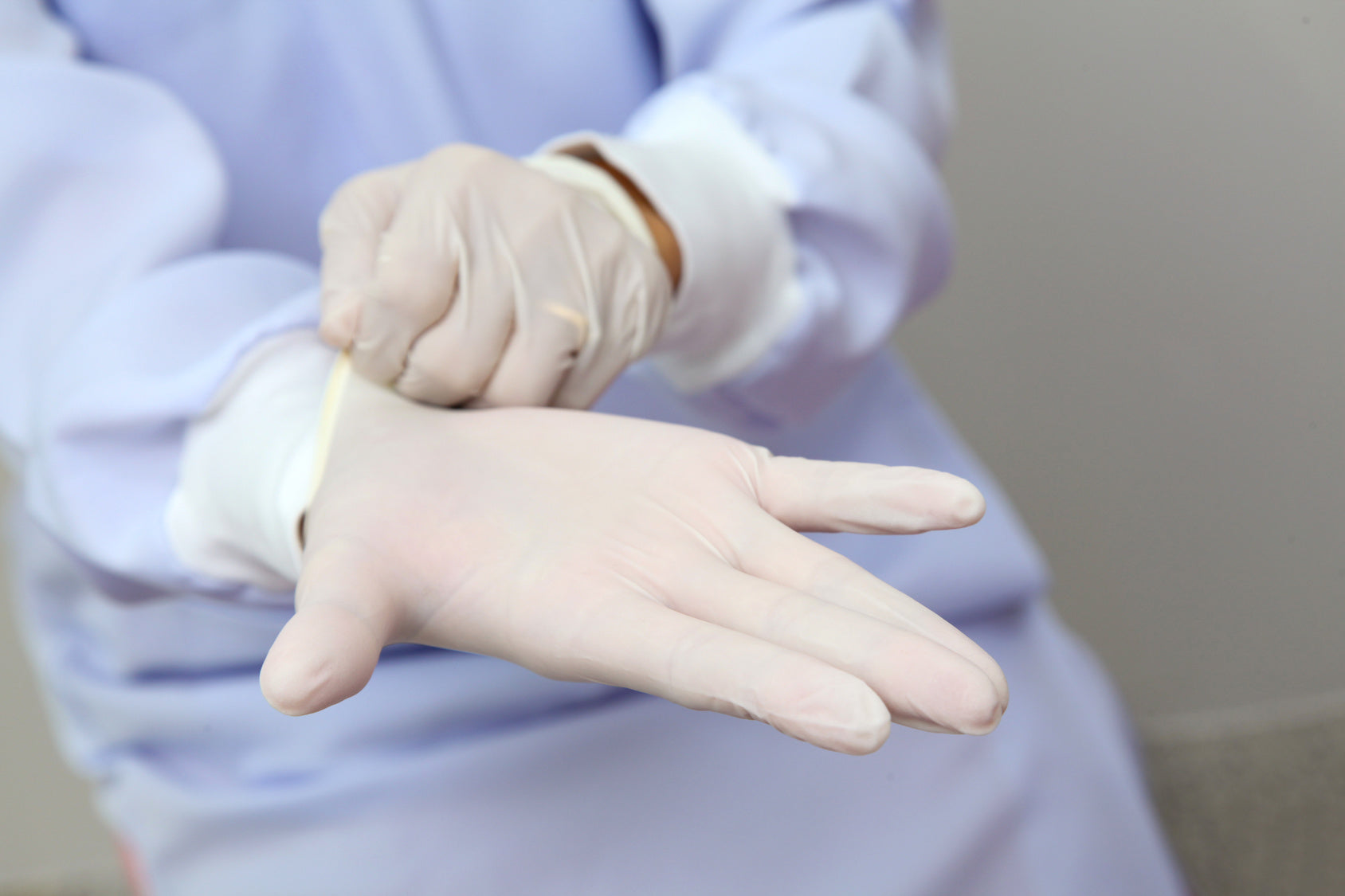
Latex Surgical Gloves and Non-Latex Surgical Glove Alternatives
Are you a medical or dental professional who is looking into purchasing surgical gloves? Do you have a latex allergy, or are concerned one of your staff members or patients might? Are you looking for some alternatives to disposable latex gloves?
If you answered yes to any of the questions above, we have some useful information for you. In this article, we will discuss latex allergies and how to choose the surgical gloves for patients suffering from a latex allergy.
Did You Know?
Latex allergies affect less than 1% of the general population in the US.
However, 8-17% of workers in the health care industry are also affected or sensitized to natural rubber latex. Other people who are at risk of becoming sensitized are those who work in the rubber industry, those who have had multiple surgeries, and children with spina bifida.
What is Natural Rubber Latex?
In short, Latex is natural rubber. It's primarily made from Hevea brasiliensis, otherwise known as the Rubber Tree.
Latex is used in a wide variety of products. However, one of the most well-known products it's used in is surgical gloves.
Types of Reactions
Generally, there are 3 types of reactions to latex. They are Immediate/Delayed Hypersensitivity and Contact Dermatitis. Below are descriptions of each.
Immediate Hypersensitivity occurs when there is a reaction to one or more of the proteins in natural rubber latex. Symptoms such as hives, itching, wheezing, chest tightness, difficulty breathing, and in some cases, even anaphylaxis, can occur within as little as 30 minutes.
Delayed Hypersensitivity is exactly what it sounds like. It's an allergic reaction which typically occurs as a result of the processing chemicals used in the manufacturing of natural rubber latex. Symptoms are said to occur within 48 to 96 hours of exposure.
Contact Dermatitis isn't an allergic reaction. It develops when something irritates your skin. Symptoms of this are dry, cracked hands which may sting, burn, itch, and/or bleed.
When trying to select the appropriate surgical gloves, there are several different factors to consider:
- Is the patient or surgical staff allergic to natural rubber latex?
- What type of procedure or surgery is being performed?
- What type of glove is most appropriate for this procedure?
- Will one pair of gloves be sufficient, or is it possible that double-gloving may be necessary?
The type of glove that is best suited for your needs depends on the outcome of the questions listed above.
Types of Surgical Gloves
There are many different types of surgical gloves on the market. In the following section, we will discuss latex gloves, in addition to some latex-free surgical gloves alternatives which may be used in the event that potential allergies are of primary concern.
Natural Rubber Latex
Natural Rubber Latex or NRL surgical gloves are the most dominant type of surgical glove. Latex gloves are favored by many healthcare professionals because of the strong, protective barrier they create against things like chemicals, blood, bodily fluids, and other microorganisms. Green surgical gloves by Medline are one of the most popular choices.
During the manufacturing process, various chemicals are added to to the natural rubber latex. As a result of this, gloves made of natural rubber latex have several qualities unique to them. Among these are elasticity, tensile strength, and durability.
Latex gloves are well known and praised for their elasticity. Additionally, their tensile strength, or resistance to breaking under tension, is another unique feature which makes them popular.
Finally, latex gloves are more durable than anything else on the market. Due to their elasticity and tensile strength, they hold up to more wear than some of their other counterparts. When purchasing gloves for surgical use, durability needs to be a top consideration.
Popular NRL Alternatives
If you need surgical gloves but are concerned about the potential for latex allergies, there are a few other options for you to choose from.
It is important to note, however, that even surgical gloves which are marketed as NRL-free could still pose the threat of causing an allergic reaction. This has to do with how the gloves are manufactured. Some of the chemicals used during the manufacturing process may be similar to, if not the same as those used in the manufacturing of latex gloves.
As such, while the gloves themselves will not contain any latex, the chemicals within them could possibly cause a similar type of reaction.
2. Nitrile
One alternative to latex gloves is nitrile. Nitrile surgical gloves are a suitable alternative for several reasons.
First, it provides the protective barrier that is required for those in the healthcare industry who will be coming into contact with various chemicals, fluids, and microorganisms.
Additionally, gloves made from nitrile are thicker than some other latex alternatives, so they are safe for use in situations requiring extended contact. They also feature excellent puncture resistance, which is another important consideration to bear in mind when purchasing surgical gloves.
Some cons, however, are that nitrile is not as elastic as some other materials. It also releases cyanide when incinerated.
3. Chloroprene
Chloroprene gloves are another alternative to latex gloves. Gloves manufactured from this material provide good tensile or tear strength, chemical resistance, and elasticity, among other things.
If you are looking for a glove that is most comparable to latex, chloroprene is likely be the perfect option for you.
4. Vinyl
Vinyl gloves are yet another alternative to latex. However, when compared to other surgical gloves, vinyl does not rank high on the list. Although they are the most cost-effective option, many important features and qualities are left out.
Vinyl gloves tear easily, do not provide adequate elasticity, and release a carcinogen upon incineration.
Need Help?
When purchasing gloves for any use, be it surgical or otherwise, it's a good idea to fully research each option and its respective pros and cons prior to making a purchase.
Additionally, it is important to evaluate each option carefully, as the quality and features of each glove can vary greatly from one manufacturer to another.
If you need help in this area, we can assist you in finding the right glove to meet your needs. Whether they are for use within the healthcare industry or another industry such as the automotive, food/restaurant, or tattoo industry, we have the gloves for you.
Don't hesitate to contact us with any questions you have.





